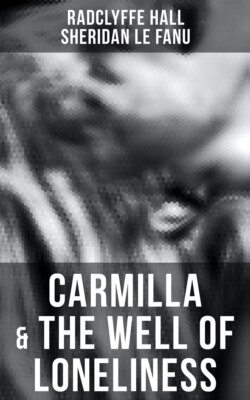Читать книгу Carmilla & The Well of Loneliness - Radclyffe Hall - Страница 63
На сайте Литреса книга снята с продажи.
3
ОглавлениеLike some vile and prolific thing, this first quarrel bred others, and the peace of Morton was shattered. The house seemed to mourn, and withdraw into itself, so that Stephen went searching for its spirit in vain. ‘Morton,’ she whispered, ‘where are you, Morton? I must find you, I need you so badly.’
For now Stephen knew the cause of their quarrels, and she recognized the form of the shadow that had seemed to creep in between them at Christmas, and knowing, she stretched out her arms to Morton for comfort: ‘My Morton, where are you? I need you.’
Grim and exceedingly angry grew Puddle, that little, grey box of a woman in her schoolroom; angry with Anna for her treatment of Stephen, but even more deeply angry with Sir Philip, who knew the whole truth, or so she suspected, and who yet kept that truth back from Anna.
Stephen would sit with her head in her hands. ‘Oh, Puddle, it’s my fault; I’ve come in between them, and they’re all I’ve got—they’re my one perfect thing—I can’t bear it—why have I come in between them?’
And Puddle would flush with reminiscent anger as her mind slipped back and back over the years to old sorrows, old miseries, long decently buried but now disinterred by this pitiful Stephen. She would live through those years again, while her spirit would cry out, unregenerate, against their injustice.
Frowning at her pupil, she would speak to her sharply: ‘Don’t be a fool, Stephen. Where’s your brain, where’s your backbone? Stop holding your head and get on with your Latin. My God, child, you’ll have worse things than this to face later—life’s not all beer and skittles, I do assure you. Now come along, do, and get on with that Latin. Remember you’ll soon be going up to Oxford.’ But after a while she might pat the girl’s shoulder and say rather gruffly: ‘I’m not angry, Stephen—I do understand, my dear, I do really—only somehow I’ve just got to make you have backbone. You’re too sensitive, child, and the sensitive suffer—well, I don’t want to see you suffer, that’s all. Let’s go out for a walk—we’ve done enough Latin for to-day—let’s walk over the meadows to Upton.’
Stephen clung to this little, grey box of a woman as a drowning man will cling to a spar. Puddle’s very hardness was somehow consoling—it seemed concrete, a thing you could trust, could rely on, and their friendship that had flourished as a green bay-tree grew into something more stalwart and much more enduring. And surely the two of them had need of their friendship, for now there was little happiness at Morton; Sir Philip and Anna were deeply unhappy—degraded they would feel by their ceaseless quarrels.
Sir Philip would think: ‘I must tell her the truth—I must tell her what I believe to be the truth about Stephen.’ He would go in search of his wife, but having found her would stand there tongue-tied, with his eyes full of pity.
And one day Anna suddenly burst out weeping, for no reason except that she felt his great pity. Not knowing and not caring why he pitied, she wept, so that all he could do was to console her.
They clung together like penitent children. ‘Anna, forgive me.’
‘Forgive me, Philip—’ For in between quarrels they were sometimes like children, naïvely asking each other’s forgiveness.
Sir Philip’s resolution weakened and waned as he kissed the tears from her poor, reddened eyelids. He thought: ‘To-morrow—to-morrow I’ll tell her—I can’t bear to make her more unhappy to-day.’
So the weeks drifted by and still he had not spoken; summer came and went, giving place to the autumn. Yet one more Christmas visited Morton, and still Sir Philip had not spoken.
